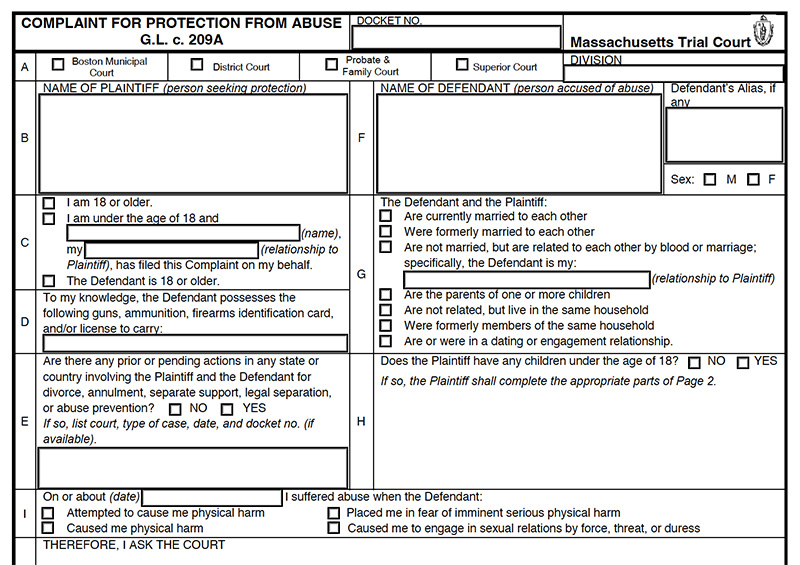Chapter 186: Change the Locks for Those Under Threat of Domestic Violence
. Posted in News - 0 Comments
By Kimberly Rau, MassLandlords, Inc.
Renters who are under immediate threat of domestic violence may request that their landlords change the locks, according to MGL Chapter 186, Section 26. Established in 2013, this law applies to all landlords and covers all renters, public and private, as opposed to the federal Violence Against Women Act, which applies only to those receiving federal public housing assistance.

Changing the locks on a tenant is illegal in most circumstances, but when it comes to domestic violence, landlords who act in good faith are protected under MGL Chapter 186. (Image License: Jaye Haych for Unsplash)
Typically, we tell landlords that they cannot change the locks on their tenants, as doing so could constitute an illegal eviction. But in the case of domestic violence, the law, officially titled “An Act Relative to Housing Rights for Victims of Domestic Violence, Rape, Sexual Assault, and Stalking,” makes an exception, if the threat is credible (more information on that shortly) and you act in good faith.
Domestic Violence Can Happen to Anyone
Anyone can find themselves in an abusive relationship. Statistics collected by the National Coalition Against Domestic Violence report that 33.9% of women and 31.7% of men in Massachusetts have experienced physical violence, sexual violence and or/stalking from an intimate partner in their lifetimes.
Unfortunately, it doesn’t always stop there. Data from Jane Doe Inc., a Massachusetts group, shows that there have been 11 domestic violence homicides so far in 2023 (as of this writing, it was early autumn). There were 25 such homicides in 2022.
The laws discussed in this article apply to people of all genders, in any type of domestic relationship, romantic or otherwise. Family members, ex-spouses or other former intimate partners, and cohabitants may also be victims of or perpetrate domestic violence.
MGL Chapter 186, Section 26: Change the locks if tenant reasonably believes they are in danger.
MGL Ch. 186, S. 26 instructs landlords to change the locks of a rental unit upon request if the tenant is under “imminent threat” of domestic violence, rape, sexual assault or stalking. This request can come from a tenant, co-tenant or other household member. The statute defines “household member” as someone living with the tenant or co-tenant who is a legal adult or an emancipated minor.
If a tenant requests a lock change because they reasonably believe they are in immediate danger of domestic violence on the premises, you (or your property manager) must change the locks for the individual unit.
As it is written, the law does not state that such a request must come in writing. Your renter may make a verbal request, and you must honor that. Best practice here is to comply with the request, and then send a text message or email summary so you both have a record in writing. “Hi, Tina, for both of our records, I am confirming receipt of your lock change request on [date]. The locks have been changed and your copy of the key will be waiting in the office.”
Once the request has been made, you have two business days to make a good-faith effort to change the locks. You may also give the tenant permission to change the locks (and provide you with a key). You can charge a fee for re-keying the unit, but it cannot exceed the market price for such a service in your area.
If you do not change the locks, either due to laziness or because you are not acting in good faith, your renter may change the locks anyway. You may also be held liable for damages resulting from your inaction, including being held civilly liable for any harm that comes to your tenant. You could also be required to pay three times the rent, plus attorney’s fees.
What if the tenant believes they are in danger from someone else in the rental unit?
If the alleged perpetrator also lives in the unit as a tenant, co-tenant or household member, you may still change the locks, and deny the accused a key. However, in this instance, the tenant making the request must also provide evidence of a protective order against the accused, or a court record that indicates the accused presents an imminent threat of domestic violence, rape, sexual assault or stalking.

If your renter is in danger from someone who lives with them, you may deny the other resident a key if your tenant has a restraining order or other court paperwork against them. This complaint is not proof, but filing a complaint is the first step for a renter to get proof. (Image: Public Domain)
Can I ask my tenant for proof that they are in imminent danger?
If a renter requests you change the locks, there are certain times when you can request proof of their status as a survivor of abuse as categorized in the law. You may also request the name of the perpetrator, if it is known.
We recommend you tread lightly here. If your renter is asking you to change the locks against someone who also lives with them, you must get proof of the protective order or court record as outlined above, but don’t pry. If a judge has determined this person is in danger, it’s not up to you to ask for more details, which could be quite traumatic for a survivor of any kind of violence.
If your tenant is asking for a lock change against a former partner who may have had a copy of the key but who is not on the rental agreement, you may not ask for proof at all. But be careful. Just because someone isn’t on the legal paperwork doesn’t mean they automatically have no right of occupancy. In Slavin v. Lewis, the courts determined that Nanette Lewis, the longtime partner of Sumner Slavin, was not a “trespasser” or “mere guest” after they broke up simply because she was not on the rental agreement. The person your renter is accusing may still have right of occupancy, depending on the circumstances.
My tenant requested I change the locks on someone who lives with them, but they don’t have the proof they need for me to do it.
Imagine this scenario. Your tenant, Tommy, comes to you and verbally requests that you change the locks to keep his ex-partner, Tony, out of the rental unit. Tommy says that Tony moved out weeks ago but has been returning to the apartment and acting violent. Both men are on the lease, and Tommy does not have a restraining order or other court paperwork to document his claims.
This is a tricky situation. In this instance, we recommend changing the locks (acting in good faith), but sending an e-mail to Tommy to create a paper trail and explain what limitations you are under without proof as required by law.
We suggest saying something like, “Hi Tommy, sending this for our records: I changed the locks today in response to you verbally notifying me of an imminent problem arising from Tony. I have not given Tony a key, but if he asks, I have to. I'm sorry you're going through this. Please take advantage of the resources at https://masslegalhelp.org/domestic-violence. If a restraining order is necessary, please show that to me as soon as you have it. That is required before I can deny Tony his key. If you obtain a court order stating he is a threat and you are in imminent danger, I can accept that as well.”
Why do I need to change the locks if my renter has a restraining order?
In a perfect world, restraining orders, or orders of protection, would be all anyone needed to stay safe from their abusers. Unfortunately, if the accused decides to violate that restraining order with the intent of harming someone, a piece of paper won’t keep your renter safe.
In early 2023, Newton resident Nancy Hanson obtained a restraining order against her husband, Richard. Two days later, he allegedly violated that order and killed her. Their minor child made the 911 call. According to the Boston Globe, Richard Hanson had previously been arrested on charges of violating a restraining order in 2021.
Changing the locks on your apartment could save someone’s life if it prevents their abuser from entering the unit.
MGL Chapter 186, Sections 27 and 28: No retaliation or circumventing the law.
MGL Chapter 186, Section 27, allows the court to impose damages against landlords who do not change the locks or otherwise retaliate against their renter for requesting a lock change. Section 27 also states that if a court-issued order of protection is in place, the property owner may not interfere with it by refusing to change the locks.
If you have an old house, it may be time to retire those old locks and upgrade to something more modern. Old woodwork and lock holes may have trouble accepting commercially available modern locks, and hanging on to outdated locks with their finicky keys is fighting a losing battle. On the other hand, electronic locks can easily be “rekeyed” by changing their access codes.
Section 28 states that anything in a rental agreement that attempts to waive this protection is unenforceable. In other words, you cannot have a clause in your lease that states you will not change the locks, or that tenants will have to pay an exorbitant fee to have the locks changed.
MGL Chapter 186, Section 29: Landlords who act in good faith are immune to liability or damage claims.
If your tenant asks you to change the locks because someone else on the lease is posing a danger to them, you may be worried that the accused will attempt to take you to court on charges of an illegal lockout. The law has you covered.
Section 29 of the same chapter states that owners who act in good faith to follow the law are immune from liability or damage claims resulting from their actions. In other words, if your renter shows you a protection order between them and another tenant, and you change the locks and deny the perpetrator a key based on that order, the accused cannot collect damages from that action.
The phrase “in good faith” is important here. If you are going to restrict someone on the lease from entering their home, you need to see the appropriate documentation before changing the locks. If your renter does not have that yet, point them toward the domestic violence resources in your county. If they believe they are in immediate danger, encourage them to call the police, which may expedite getting a restraining order.
MGL Chapter 186, Section 25: Don’t deny tenancies due to a past affected by domestic violence.
Section 25 of Chapter 186 protects survivors of domestic abuse by not allowing landlords to hold the effects of it against them. If you have a prospective renter who is qualified, but you learn from a reference check that at one point they requested a lock change, you cannot disqualify them for that. That goes for any other right to protection they may have exercised in the past as well.
Conclusion
It is unlawful to discriminate against people for their race, ethnicity, sexuality and many other protected classes. Denying someone housing because their lives have been impacted by domestic violence will also run you afoul of HUD’s fair housing laws and Massachusetts law.
If one of your tenants asks you to change the locks because they fear for their safety, you must comply. If they ask you to lock out another member of the household and they can provide the appropriate documentation, you must comply and you will be protected. In all cases, you must act on the concern in good faith. If you are in doubt, speak with your attorney, keeping in mind the two-day deadline.




